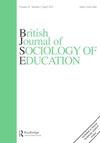城市街区与基础教育指导咨询:一种空间正义的方法
IF 2.1
3区 教育学
Q1 EDUCATION & EDUCATIONAL RESEARCH
引用次数: 0
摘要
本文章由计算机程序翻译,如有差异,请以英文原文为准。
Urban neighbourhoods and guidance counselling in basic education: a spatial justice approach
Abstract This study sought to gain a deeper understanding of the spatiality and spatial justice of guidance counselling in basic education. The spatial framework was applied to analyse the recognition of diversity and adolescents’ positioning in guidance counselling (lessons, excursions and information events). This study used a phenomenological research approach based on fieldwork, observations and lifespan interviews conducted with a class located in a disadvantaged urban neighbourhood in Finland. The outcomes reveal how adolescents adjust or take counter positions to prevailing expectations attached to their neighbourhoods. The transition to upper-secondary education was geographical, social and cultural, and the guidance counselling was able to provide inclusive and affirmative support for transitions. Simultaneously, guidance is vehicle for cultural adaptation to the working-class position and tend to lack a recognition of the diversity and counter positions of adolescents. This paper discusses the multicultural competence of counsellors and the potentiality of group-based guidance.
求助全文
通过发布文献求助,成功后即可免费获取论文全文。
去求助
来源期刊
CiteScore
3.70
自引率
9.50%
发文量
74
期刊介绍:
British Journal of Sociology of Education is one of the most renowned international scholarly journals in the field. The journal publishes high quality original, theoretically informed analyses of the relationship between education and society, and has an outstanding record of addressing major global debates about the social significance and impact of educational policy, provision, processes and practice in many countries around the world. The journal engages with a diverse range of contemporary and emergent social theories along with a wide range of methodological approaches. Articles investigate the discursive politics of education, social stratification and mobility, the social dimensions of all aspects of pedagogy and the curriculum, and the experiences of all those involved, from the most privileged to the most disadvantaged. The vitality of the journal is sustained by its commitment to offer independent, critical evaluations of the ways in which education interfaces with local, national, regional and global developments, contexts and agendas in all phases of formal and informal education. Contributions are expected to take into account the wide international readership of British Journal of Sociology of Education, and exhibit knowledge of previously published articles in the field. Submissions should be well located within sociological theory, and should not only be rigorous and reflexive methodologically, but also offer original insights to educational problems and or perspectives.

 求助内容:
求助内容: 应助结果提醒方式:
应助结果提醒方式:


